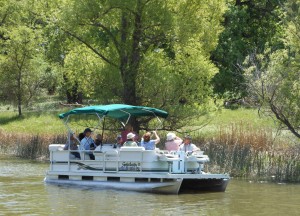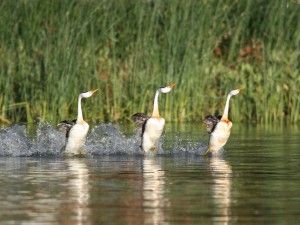ZOOM Programs 2020-2021
Thursday, May 20, 2021, 7 p.m.
Beaver in California, Creating a Culture of Stewardship
To register, click here: Redbud Audubon Program Registration 
The Redbud Audubon Society will be presenting a Zoom program on Thursday,May 20 starting at 7 p.m. This will be the chapter’s last program until programs and field trips resume in September. Please join us for “Beaver in California: creating a culture of stewardship,” to be presented by Kate Lundquist and Brock Dolman.
Beavers are a vital part of aquatic ecosystems across North America. They came close to extinction in California by the late 1800s. Lundquist and Dolman of the Occidental Arts and Ecology Center WATER Institute will share the historic and current plight of this “keystone” species, interesting facts about its remarkable biology and how the North American Beaver can benefit humans, birds and the environment. Learn how this ecosystem engineer is helping urban and rural communities restore watersheds, recover endangered species and increase climate change resiliency. Brock and Kate will share how over 10 years of research and collaborative restoration are successfully working to Bring Back the Beaver across California.
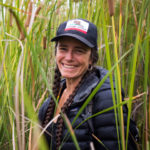 Lundquist co-directs the Occidental Arts & Ecology Center’s WATER Institute and the Bring Back the Beaver Campaign. Kate collaborates with landowners, communities, tribes, conservation organizations and resource agencies to uncover obstacles, identify strategic solutions, and implement beaver-based restoration treatments to conserve watersheds, recover listed species, increase water security and build resilience to climate change (www.oaec.org/beaver).
Lundquist co-directs the Occidental Arts & Ecology Center’s WATER Institute and the Bring Back the Beaver Campaign. Kate collaborates with landowners, communities, tribes, conservation organizations and resource agencies to uncover obstacles, identify strategic solutions, and implement beaver-based restoration treatments to conserve watersheds, recover listed species, increase water security and build resilience to climate change (www.oaec.org/beaver).
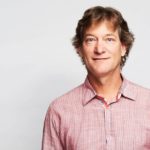 Dolman is a co-founder of the Sonoma County based Occidental Arts and Ecology Center (www.oaec.org), where he co-directs with Kate Lundquist the WATER Institute’s Bring Back the Beaver Campaign (https://oaec.org/projects/bring-back-the-beaver-campaign/). He is a wildlife biologist and watershed ecologist who has been actively promoting the idea of Rewilding Beaver in California since the early 2000’s. He was given Salmonid Restoration Federation’s coveted Golden Pipe Award in 2012: for his leading role as a proponent of working with beavers to restore native salmon habitat.
Dolman is a co-founder of the Sonoma County based Occidental Arts and Ecology Center (www.oaec.org), where he co-directs with Kate Lundquist the WATER Institute’s Bring Back the Beaver Campaign (https://oaec.org/projects/bring-back-the-beaver-campaign/). He is a wildlife biologist and watershed ecologist who has been actively promoting the idea of Rewilding Beaver in California since the early 2000’s. He was given Salmonid Restoration Federation’s coveted Golden Pipe Award in 2012: for his leading role as a proponent of working with beavers to restore native salmon habitat.
Thursday, April 15, 2021, 7 p.m.
“Wildlife and Wildfire: Animal Adaptations for a Dynamic Ecosystem”
To register, click here: Redbud Audubon Program Registration
On Thursday, April 15, at 7 p.m. the Redbud Audubon Society is pleased to host Lynn Schofield, a biologist for the Institute for Bird Populations who will present a Zoom program on Wildlife and Wildfire: Animal Adaptations for a Dynamic Ecosystem.
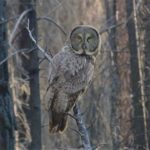 Wildfires are an important part of many ecosystems around the world including those of California. Fires provide an opportunity for new growth, to return nutrients to the soil, and to create a wholly unique type of habitat.
Wildfires are an important part of many ecosystems around the world including those of California. Fires provide an opportunity for new growth, to return nutrients to the soil, and to create a wholly unique type of habitat.
California’s species have adapted to survive and thrive in ecosystems defined by fire, and they have developed a wide variety of strategies for making the best of the post-fire habitat. However, these systems exist in a delicate balance. Recently, forest fires have been increasing in size, intensity, and frequency due to human activities, and even fire-adapted species are struggling to keep up. In this talk Schofield will discuss how animal s persist in a system defined by fire and what can be done to help protect the balance of these ecosystems.
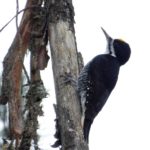
Schofield’s research covers a diversity of topics including bird migration, forest fire ecology, and wetland conservation. In addition to using her research to help inform effective conservation strategies, Lynn also works to help make connections with nature accessible to all. She is one of the core members of the Cal Falcons social media project, a trip leader for the Bay Area chapter of the Feminist Bird Club and a long-time volunteer for the Golden Gate Raptor Observatory.
As with all of Redbud Audubon’s Zoom programs, participants are asked to register so the host can send you the link for the meeting. To register for the program click on this link: Redbud Audubon Program Registration. Submitting the form will register you for the meeting. Participants will need to register each month for different programs as the Zoom link will change. A new Zoom link will be sent out at noon the day of the program for everyone who has registered. This procedure prevents anyone from disrupting the meeting by “bombing,” it.
Thursday, March 18, 2021, 7 p.m.
“Extraordinary Ordinary Birds of California’s Oak Woodlands”
Mendocino County resident, Kate Marianchild, naturalist and author of Secrets of the Oak Woodlands,will present a Zoom program for the Redbud Audubon Society on Thursday March 18, starting at 7 p.m. entitled “Extraordinary Oridnary Birds of California’s Oak
Woodlands.”
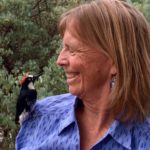
In a talk illustrated with audio and video recordings as well as beautiful slides, Marianchild will discuss some of the extraordinary birds that live right here in Lake County: tiny birds who build one of the ten most interesting nests in the world; woodpeckers who live in clans and share everything from food and nests to childcare and mates; and ducks who eat acorns and set off on “quad-athlons” when they are two days old.
Supporting a whopping 262 species, oak woodlands are California’s premier bird habitat and the nation’s third most important bird habitat. Many of those 262 species are so familiar to most people that they dismiss them as ordinary. But are any of them actually ordinary? “No,” says Marianchild. “Each one has had to acquire its own unique characteristics and behaviors, and some are truly extraordinary.”
Attendees will learn about little gray-brown birds who give each other showers and groom each others’ armpits; a riparian species whose members walk on river bottoms; and jays whose intelligence rivals that of chimpanzees. The talk will conclude with “The Great Blue Heron and the Chorus Frogs,” a true story with a surprise ending.
This presentation will open your eyes to the marvelous survival strategies, behaviors, and social structures of birds we see every day in California’s oak woodlands, and these birds will never again seem ordinary.
As with all of Redbud Audubon’s Zoom programs, participants are asked to register so the host can send you the link for the meeting. To register for the program click on this link: Redbud Audubon Program Registration or go to www.redbudaudubon.org and click on this same link on the home page of the website. Submitting the form will register you for the meeting. Participants will need to register each month for our different programs as the Zoom link will change. A new Zoom link will be sent out at 6:30 p.m. the night of the program for everyone who has registered. This procedure prevents anyone from disrupting the meeting by “bombing” it.
Here is what you missed:
Thursday, February 18, 2021, 7 p.m.
Real Life Great Horned Owl Soap Opera
Karla Bloem, Founder and Executive Director, International Owl Center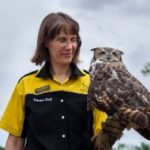
The Feb. 18 monthly Zoom program meeting for the Redbud Audubon Society will feature Karla Bloem, Founder and Executive Director of the International Owl Center. Karla will also have a live Great Horned Owl to accentuate her program.
A real-life soap opera has played itself out over the past 15 years between over 25 captive and wild Great Horned Owls that have formed the basis of an in-depth vocal study on the species. You’ll experience owl dating, divorce, territorial defense, and more as you learn about their wide variety of vocalizations, and what they mean. Ruby the Great Horned Owl will make a live appearance in this one-of-a-kind entertaining and educational program.
Karla Bloem acquired Alice the Great Horned Owl to use in educational programs in 1998 and began studying Great Horned Owl vocalizations in 2004. Karla is now the world authority on their vocalizations and has given presentations in The Netherlands, Germany, Argentina, Italy, Portugal, and South Africa. Alice’s popularity led Karla to create the International Festival of Owls, the first full-weekend, all-owl event in North America that has served as the inspiration for similar festivals in Italy, Nepal, and India. Karla and Alice testified before the Minnesota House and Senate environment committees to successfully gain protection for Great Horned Owls in 2005. She has assisted several authors and filmmakers and has appeared on Animal Planet and the CBC Network’s “The Secret Life of Owls.”
As with last months’ Zoom program, we are asking participants to register so the host can send you the link for the meeting. To register for the program, go to the link on page one of the February online newsletter to connect to the registration form. This is a very simple and easy process, so please join us
Thursday, January 21, 2021, 7 p.m.
Northern Saw-whet Owl Monitoring Project
presented by Ken Sobon, director of the Northern Saw-whet Owl Research and Education Project in Northern California
To register for Zoom meeting, click link: https://forms.gle/2tDTM1gpp4CsvtwJA
Redbud Audubon’s Saw-whet Owl Program Registration
Tuesday, Sept. 15, 2020, 7 p.m.
Birding Indonesia’s Lydekker’s Line
with Matthew Matthiessen Peregrine Audubon, Ukiah
Join us this evening as we go Birding Lydekker’s Line with Matthew Matthiessen. Near the east end of the Indonesian archipelago, just before reaching New Guinea, lies Lydekker’s Line. Although invisible to the eye, it does mark the boundary forming the eastern limit of Asian bird species. Matthiessen is an engag- ing and entertaining speaker, as well as a world-class photographer.
Zoom link: Send email to webmaster Cheryl at cwatson@pacific.net
Thursday, Sept. 17, 2020, 7 p.m.
Wildlife and Wildfire: Animal Adaptations for a Dynamic Ecosystem Golden Gate Audubon, San Francisco
Wildfires are an important part of many ecosystems around the world. Fires provide an opportunity for new growth, to return nutrients to the soil, and to create a wholly unique type of habitat. However, these systems exist in a delicate balance. Recently, forestfires have been increasing in size, intensity, and frequency due to human activities, and even fire-adapted species are struggling to keep up.
In this talk we discuss how animals survive and thrive in a system defined by fire and what we can do to help protect the balance of these special ecosystems. Speaker Lynn Schofield is a biologist for the Institute for Bird Populations.
Her research covers a diversity of topics including bird migration, forest fire ecology, and wetland conservation.
Zoom link: Send email to Communications Manager Melissa at mramos@goldengateaudubon.org.
Monday, Sept. 21, 2020. 6:30 p.m.
Are We Polarized? Birders and Bird Photographers
Altacal Audubon, Chico
Presenters: Joan Robins and John Seid
Although birders might become irate when bird photographers venture too close and flush a special species, and bird photographers might not welcome a large group of birders to a remote spot where they have remained silent and immobile for hours hoping for a peek at a shy rail, we are all aligned in our love of the natural world. Joan and John will talk about some of the differences and similarities in the two areas of expertise, show where there is much overlap, and discuss how each can learn from the other.



